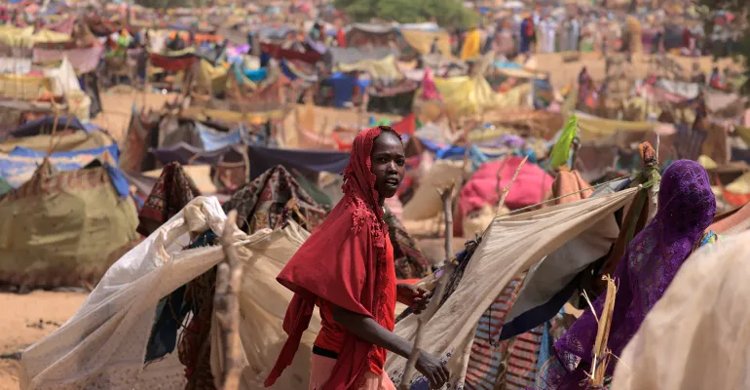International Desk: Nine months into a bloody war, nearly eight million people have been forced from their homes in Sudan, the United Nations says, calling for urgent additional support to cope with the crisis.
The UN High Commissioner for Refugees reported the alarming figure on Wednesday as High Commissioner Filippo Grandi concluded a visit to Ethiopia, to which many of the displaced people have fled. The UNHCR said it is facing a chronic shortfall in needed funds.
Since April 2023, more than 100,000 people have crossed into Ethiopia from Sudan, including close to 47,000 refugees and asylum seekers. About 50,000 Sudanese refugees were already in the country.
Grandi called for “urgent and additional support to meet their needs” as he inspected the efforts of the Ethiopian government and the UNHCR to assist.
Five other neighbouring countries have also received huge numbers of Sudanese refugees. More than half a million people have fled to Chad since April. On average, 1,500 people cross daily into South Sudan.
The latest wave of violence in the 20-year conflict has left nearly half of Sudan’s 49 million people requiring aid. The UN reports that 12,000 people had been killed by the end of 2023, but the actual death toll is believed to be higher.
Chaos
Sudan plunged into chaos last April when long-simmering tensions between the military, led by General Abdel Fattah al-Burhan, and the paramilitary Rapid Support Forces, headed by Mohamed Hamdan Dagalo, also known as Hemedti, erupted into street battles in the capital, Khartoum, and other areas.
The violence has extended from an earlier conflict that began in 2003, when rebels from the territory’s ethnic sub-Saharan African community launched an armed rebellion, accusing the Arab-dominated government in Khartoum of discrimination and neglect.
The government, under then-President Omar al-Bashir, responded with aerial bombings and unleashed the militia group Popular Defence Forces, also known as the Janjaweed, which is accused of mass killings and rapes. Up to 300,000 people were killed and 2.7 million were driven from their homes.
Internationally-brokered deals and peacekeeping forces have struggled to subdue the violence over the last two decades.
Khartoum ravaged
According to a report by the UN agency International Organization for Migration last year, approximately three million of the displaced are originally from Khartoum, the epicentre of the conflict.
For months now, the RSF has controlled most of the city, making life impossible for locals, contributing to reducing entire neighbourhoods to rubble by embedding its fighters in residential areas, which are then indiscriminately shelled and bombed by the army.
While millions have fled the city, some are too poor to leave, while others have stayed behind, fearing that the RSF will confiscate and loot their homes if they flee.
Funding shortage
Ethiopia hosts one of the largest refugee and internally displaced populations globally, the UN notes.
As the third largest refugee-hosting country in Africa, it is currently home to nearly one million displaced people – mainly from South Sudan, Somalia, Eritrea, and Sudan. An estimated 3.5 million Ethiopians are internally displaced.
At the end of last year, UNHCR’s programmes in Ethiopia were less than half-funded, with just 36 percent of the $431m needed.
In 2024, the overall requirements for UNHCR’s response in Ethiopia totals $426m.
Source: Al Jazeera and news agencies

